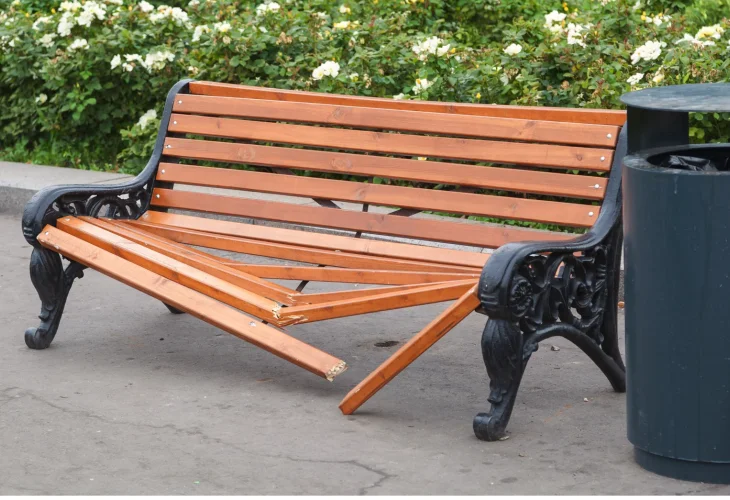Jewish Law
Three Torah Giants and a Broken Bench
If four people sit down on a bench and it collapses, must they pay damages? We bring you the answer from France, one thousand years ago...
 (Photo: shutterstock)
(Photo: shutterstock)Ramerupt is a small town halfway between Strasbourg and Paris, home to just 384 souls. For nine hundred years, there have been no Jews there. The Second Crusade, led by the priest Bernardus, wiped out the Jewish community in Ramerupt, which the Jews called "Romerog." Most of the crusaders died on the way to the Holy Land, mainly due to inept leadership, but they still sowed ruin and destruction in Jewish communities along their path.
How many Torah scholars would have given everything they possessed to merit a brief visit to the Jewish quarter of Romerog a few years before the Crusade! In that tiny town lived Rabbi Meir of Romerog, the son-in-law of the holy Rashi, who was married to his daughter Yocheved, and his sons: Rabbi Jacob, known as Rabbeinu Tam, and Rabbi Samuel, known as Rashbam. (Their brother, Rabbi Shimshon, was the grandfather of the Ritzba and the R"Sh of Shantz.) Another son-in-law was Rabbi Simcha, author of Machzor Vitry, father of Rabbi Isaac who was known as R"i the Elder, and another son-in-law was Rivan, the Talmud commentator and Tosafist. Rabbi Meir and his wife Yocheved lived long lives, passing away in 1135, a few years before the Crusade, and they merited to see their descendants, giants of Torah, bequeath the Tosafot commentaries on the Talmud to the Jewish people.
***
The Jewish quarter of Romerog was a single, long, narrow street, ending at the synagogue. The Jews lived in high, narrow, cramped houses built right next to one another. In the house next to the synagogue lived a poor widow named Miriam. She was descended from one of the first families to settle in Romerog. Her home was on the ground floor of the building, and she also owned a small courtyard, bordering on the synagogue. In the courtyard was a carved wooden bench, and above it grew a small grapevine.
One day, a celebration was held in the synagogue. All the town's Jews gathered there, along with many guests. As the guests were in good spirits, they wandered down the street, and four of them sat down on the bench in Miriam's courtyard, enjoying the festive atmosphere. While they were conversing, the bench was making its own small creaking contribution -- after all, the bench was quite aged, just like Miriam herself. The widow would often sit down to rest on it, but the ancient wood was quite unprepared for four heavy guests... and it collapsed beneath them. The beautiful carved wood was reduced to a pile of splinters and the four men ruefully struggled to their feet.
The next day, Miriam headed to the Beit Din, the local rabbinical court, to sue the guests who had destroyed her bench. On the court sat three giants of Torah: Rashbam, Rabbeinu Tam, and Rabbi Azriel. Such great scholars to rule on such a simple case! As far as the old widow was concerned, four inconsiderate men had ruined her bench, having sat on it without permission, without regard for its condition; therefore they should pay her damages, each one a quarter of the bench's value. But Rashbam, who was the senior judge, surprised the court with his ruling: the four men were exempt!
"Why?" asked Rabbeinu Tam and Rabbi Azriel.
"Don't you remember what we learned from our grandfather, Rabbeinu Shlomo?" asked Rashbam. "In Tractate Bava Kamma, five people who sat on a bench and broke it are liable, 'like Papa bar Abba.' Rabbeinu Shlomo explained that this applies if they are like Papa bar Abba, who was extremely heavy. From his words I understand that an ordinary bench is designed for people to sit on. In general, a bench's owner doesn't mind when people sit down on his bench; if he does mind, then he must place a sign on it, telling people that he does not grant permission to sit down. In the absence of such a note, people are free to sit -- only if a person is extremely fat is he expected to understand that an ordinary bench is not for him, because he is likely to break it. Therefore, if regular people sat down and the bench broke, it's because the bench was already weak. Every bench has its day, and yesterday was the day for this old and decrepit bench. I am sorry for the widow's loss, but the holy Torah commands us not to diverge from correct judgment even out of mercy."
"I disagree with you," replied Rabbeinu Tam. "It's not reasonable to suggest that anyone can sit down on a bench, even if it's clearly about to break. After all, the more people sitting on it, the more the strain they subject it to. In my opinion, what the Gemara intended with its statement 'like Papa bar Abba,' is that if a very fat man sits down in such a way that the people already sitting literally cannot get up, they are not at fault if the bench breaks. However, if four regular people sit down, then they are responsible for any damage they cause to the bench."
"I agree with Rabbi Jacob's words," added Rabbi Azriel, and thus, by majority opinion, it was ruled that the guests who broke the bench were obligated to compensate the widow.
(Tosafot, Tractate Bava Kamma, page 10a)

